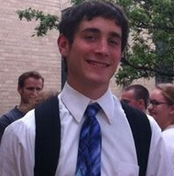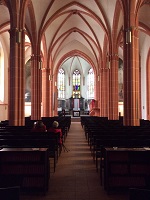![]()
Name: Charlie Ducey
E-mail: cducey@nd.edu
Location of Study: Freiburg, Germany
Program of Study: Goethe Institute
Sponsors: Innsbruk Fund
![]()
A brief personal bio:
My name is Charlie Ducey. When I’m not reading books and writing essays in pursuit of a degree in English and/or German at Notre Dame, I’m reading books and writing essays in beautiful and rainy city of Portland, Oregon. My SLA sponsored travel to Germany will precede a much longer study abroad program in Oxford, England for the 2014-2015 academic year.
Why this summer language abroad opportunity is important to me:
Coming to Notre Dame, I found myself confronted with a wall of uncertainty. But boring a hole through that wall was my resolute desire to continue to study the German language after selecting it in high school for its uniqueness. That resolution led me to a university seminar course in the German which covered literature across a number of cultures and time periods. In this course and others, I have come to appreciate the intricacies of language, especially in how different language can express ideas in ways that others can’t, e.g. the ability to form long compound nouns in German. To better understand language in general and German in particular, I want to concentrate on being able to speak German with greater proficiency. This SLA grant affords me the opportunity to do just that through formal classes and direct engagement in a land of native speakers.
The difficulty of German engages me intellectually, and learning a second language corresponds to my academic interest in literature, which grounds itself in a complete understanding of language and how words—in any language—convey meaning. Such an understanding will assist in my future studies of English literature, allowing me to tap into the different ways of thinking about language and the vast repository of German literature.
What I hope to achieve as a result of this summer study abroad experience:
Primarily, I want to come out of this experience a far more competent German speaker. I feel comfortable with my handle on reading and listening to German, but I want to bring my ability to speak and write German up to speed. My main route to accomplishing this will be interacting with classmates and my host family entirely in German without falling back on English as a crutch. The month-long program should also give me a chance to become comfortable living independently in a foreign country, a necessary form of preparation for my year-long study abroad in England. Learning how to allot money for meals, how to spend my time outside a classroom—these will all be common, everyday practices that I can carry over to next year. Beyond these practical skills, I also hope to enjoy the atmosphere of a German city during the fervor of the world cup.
My specific learning goals for language and intercultural learning this summer:
- By the end of my four weeks in Germany, I will be able to understand the basic content of a German news show or radio program.
- By the end of my four weeks in Germany, I will be able to speak German with enough confidence to carry out an actual conversation with a native speaker.
- By the end of my four weeks in Germany, I will be able to travel internationally without feeling nervous about missing flights and train connections.
- By the end of my four weeks in Germany, I will be able to write an email / short letter in German without hesitating as I compose every other sentence.
- By the end of the summer, I will be able to celebrate the victory of the U. S. men’s national soccer team over the Ghanaian team.
My plan for maximizing my international language learning experience:
Maximizing my language learning experience will require initiative on my part to speak and engage with the German language. I can do this best be speaking German with my host family upon arrival and be willing to make frequent and likely embarrassing mistakes. I also hope to take part in the tandem learning program, in which I will be paired with a German student learning English. The Goethe Institute has a fairly structured cultural-immersion program in which I will participate, as well as language learning lab for practice outside of class. On my own time, I plan on attending a lecture a Notre Dame German professor will be giving in Essen on June 11. Additionally, there is a Catholic Church nearby where I can hear mass conducting in German. I also think that it will be beneficial to spend time with other international students for whom German may be the only common medium of expression.
![]()
Reflective Journal Entry 1:
After three flights, two rounds of passing through customs (Canadian and German, I won’t bore you with the details), a bus ride, and some improvised navigation around pedestrian streets (only two near collisions with cyclists), I arrived at the dwelling (maybe a “flat” maybe an apartment, I’m not sure which) of my German host family, a rather full house with three children all aged ten or under, two gracious parents, and a mysterious college-aged dormer, whom I have yet to meet.
Bonn is a typical German city by my assessment: stout, scrunched buildings replete with right-angles and wooden accents, two parts altmodisch for every one part modern, fine-tuned public transit, grotesque but not quite vulgar graffiti embossed on secluded walls, bakeries, bakeries, many bakeries, eclectic crowds—hijabs, strollers, seemingly misplaced Chicago Bulls and Oakland Raiders regalia (two boys wearing them)—,cyclists in business suits, cigarette smoke wafting from beneath café parasols, tight cobblestone streets littered with spent cigarettes, stately museums and pillared facades of municipal governance, Bratwurst carts, Volkswagens, ICE trains. There is much left to explore.
My host family has been cordial and accommodating. I’ve been assigned to a two room corridor of the (three-story?) homestead, offered pureed fruit and yogurt, and invited to watch German children’s programming in which talented young Germans compete in various, arbitrary games, one of which was essentially just blackjack minus the gambling—which reminds me: I failed to mention above that there are street corner casinos here as well. All of these sights are redolent of my German excursions of yesteryear. The language is still tough. I’ve only spoken German since arriving here. I even prevented myself from reverting to English when ordering drinks on the plane ride over. I’ve begun compiling lists of everything I see for which I have no German word. Electricity outlet is Steckdose. Ladegerät is computer charger. Gähnen is to yawn. Clearly, I have been sitting tiredly at a desk typing for the last hour.
Tomorrow I’ll rise at an awkward hour, perhaps wander the streets, and check in at the language institute for the first day of classes. Los geht’s, Jungs!
Reflective Journal Entry 2:
At this point, I’ve logged some 16 hours at the Goethe Institute between class time and studying / wandering around the 12 shelf library on the first floor. Concerning the language classes I can say this much: the facilities are impeccably clean, despite virtually every piece of furniture, every wall, and every light fixture being glacial white. More importantly, I have learned enough vocabulary to fill three notebook pages, and since everything is conducting in German, I’ve found that even my thoughts are in German for minutes on end. There are a few odd pockets of English here and there: a Goethe institute intern / tour guide told us that the Altstadt ist sehr gut für Bars Kneipen und tolle Coffeeshops. Words have a way of migrating across seas and slipping into common usage in languages other than the ones that bore them.
As German as the Goethe Institute is, it’s also broadly international. In my class alone 8 different nationalities have representation. I’ve met Spaniards and Saudi Arabians, Hollanders and Koreans, Italians and Indonesians, Chinese and Taiwanese. Among them are professors, aspiring law students, plastic surgeons, businesswomen, pianists and orthopedic specialists.
Regarding official journaling task #6 (views toward the U. S. in sample group of native speakers), I more or less stumbled into a conversation about immigration to and from the United States, immigration, and the invasion of English names into the German lexicon. Rainer, the father of my host family told me that everyone on his side of the family has been born in North Rhine-Westphalia (German federal state in which Bonn is located) within 25 km of the city of Ulm since time immemorable (i. e. three generations). However, he said that since then, his uncle and brother have both moved to America. Rainer seemed to regard America as a place with typically large cars and a lot of space for camping. His uncle assimilated into American culture with due speed, Americanizing his name from Heinrich to Henry. That remark diverted the conversation into one about names. Apparently, there are German parents who are naming their children with names they can’t properly pronounce: Jack, Brian, Emily, even Cuba. The issue of immigration was also brought up. Germany over the last several decades has seen an influx of immigrants, especially those from Turkey, many of whom live in cultural enclaves that obviate the drive to learn German. We discussed how Spanish-speaking immigrants in America are the rough analogue to this phenomenon. I suppose in general, the perspective on America held by the Germans with whom I spoke was roughly this: Germany, in a sense, is becoming more like America, with an increased cultural diversity as the industrial center of Europe as well as the prevalence of little German boys named Michael, James, and Jack.
Reflective Journal Entry 3:
There’s something about being in a small German town where you haven’t been for just about four years’ time that can only be described as dreamlike. I don’t just mean “dreamy” or “idyllic” or “too-good-to-be-true.” I mean unreal. I actually felt a little dizzy looking again at the worn-out door stone and the threshold of the house and yellow-painted walls, the bathroom, the light of which I could not figure out how to turn on four years ago and still couldn’t figure out how to turn on now and probably wouldn’t know how to turn on four years hence. It was dreamlike, only a return visit to this town was not even something I had thought about in dreams.
I was able to speak to my former host family again and learn how their lives had progressed. The father was months from retirement, both the daughters at university, the mother learning English more rigorously. Being able to speak with them in German on the second time through made me reconsider a long-standing hypothesis of mine: personality actually can’t be contained by language barriers. We were all our old selves, I suppose, regardless of whether we were speaking German now or English back then. It’s so appropriate that one of the formal German goodbyes is Auf Wiederhören “upon hearing [you] again.”
I also had the chance to visit a Notre Dame professor in Heidelberg. A very beautiful, charitable trip all around. I saw the grave of a German philosopher my professor had known well. The man had lived to 102 and been in the hospital only once.
Regarding formal journal entry prompt #3 (local cultural holiday), I was here in Germany for Pentecost, which is a bank holiday, mandating the closure of most shops, banks (hence, bank holiday), and family travel. Subsequently, I was left home alone by my host family without access to an open grocery store. I went to the Münster, a German cathedral, for Pentecost mass. There I heard about the meaning of Pentecost from someone who I think counts as a person of “an official capacity.” He was a Catholic priest. The homily of the mass was incredibly intriguing, literally noteworthy. My notes (in German) describe the meaning of the cultural, at-its-roots-religious holiday thusly: Pentecost in the basic sense is the celebration 50 days after Easter during which the gift of the Holy Spirit is commemorated as described in the second chapter of Acts of the Apostles. It is the “birthday” of the church. What then, is the Holy Spirit? The Holy Spirit is harmony, not uniformity. Being a member of the church does not mean that you are identical to everyone else. It means you are part of one body, for the body is not one but many; there are many gifts but one spirit. What’s more, Pentecost is not about the Spirit itself so much as the reception of the Spirit by the apostles.Begeisterung, in German, which can mean excitement but also “in-spirit-ment,” inspiration. The Christian response to the Holy Spirit is what Pentecost is about, said the priest.
Speaking briefly with my host father, Pentecost in its cultural dimension is a time to enjoy a respite from a busy routine, spend time with family, and count one’s blessings. German university students and schoolchildren have several days off of school, as American students do during Thanksgiving. In a few days, another cultural event pertaining to the Catholic liturgical cycle is coming around. Corpus Christi, evidently, is what it’s called. My professor’s wife described it like this: churchgoers process through the streets, the priest kneeling before each house to administer a blessing. She was in a town once where the priest was old. Every few minutes he had to kneel to bless a house. She was sorry that he had to kneel so often. I guess it’s a kind of self-sacrifice of sorts.
Reflective Journal Entry 4:
I met Herr Heinz Schmidt for the first time when I was hurrying to a Monday trivia night at an Irish pub in Bonn Germany, walking briskly down an narrow street. I noticed an old man standing before a medieval-looking wooden door, pressing against the threshold with his walker. Without much thought I asked the man in German if he needed help and proceeded to help him open the door. He thanked me and asked my occupation, then my nationality, then my name. . . a thirty-minute-long conversation soon developed, and I arrived to trivia night fashionably late. But I had met Herr Schmidt.
The following day I took the eighty-year-old Herr Schmidt up on his offer to meet again only to hear the voice not of Herr Schmidt but of his wife Frau Schmidt answer through the speaker by the aforementioned antiquated door. Schmidt was already in bed, she said, but I could return the following morning around 10:00. So I did. Another 2 hours passed in conversation with dem sehr geehrten Herr Schmidt. Much was discussed.
Pertaining to mandatory blogging task #1, having to do with slang words, I had a particularly interesting story from the octogenarian. He explained to me the etymology of the word “O.K.” When I first met him I asked him if “everything was O.K.?” Later he asked what “O.K.” even meant. It was a rhetorical question. He explained that he had asked all the college students he’d known, and had not come up with much of an answer for the meaning or origin of O.K. I provided an answer I’d read somewhere about a society of misspellers who thought it was funny to spell all correct “oll korrekt,” abbreviated O.K. Herr Schmidt’s story was considerably more interesting. Apparently there was a Swiss farmer by the name of Oscar Krause. By way of either marginal literacy or convenience, he only ever signed papers O.K. Something about his personality was particularly mellow, so O.K. came to mean “approved” or “alright” if O.K. signed your work credentials or what have you. And then the slang proliferated. That’s okay with me.
![]()
Reflection on my language learning and intercultural gains:
It’s all about the gains. And so too with my SLA grant trip to Bonn, Germany. First, I think a quick thank you is in order: I am incredibly fortunate and glad that I was able to travel to Germany, attend classes at the Goethe Institute, stay with a thoroughly German host family, meet folks from wide and far, and learn German in Germany. My language learning, I would say, was prolific and fruitful. I filled some eight notebook pages with vocabulary, some ten more with grammar exercises and class notes–and I write tight and small, so for me that’s something. I got in the habit of looking up the name of every object in the house whose German designation was unknown to me. I really wanted to learn. My confidence in speaking definitely elevated, which what I wanted to focus on above all. I was able to make sense of a lecture delivered entirely in German, and on no simple subject at that. I had conversations with actual Germans on a daily basis. It was good.
Beyond that, I learned about a number of other things. I spent–I kid you not–16+ hours in the Bonn University Hauptbibliothek (central library) reading about German linguists, philosophers, and mathematicians, mostly in German, which made my brain pulse with activity. I spoke with a German Ph.D. candidate about his mathematics studies, an American professor of literature about Hegel and Kant, a student of ecumenical studies about Kierkegaard’s existential commitment, an English-German graduate about Hemingway, a American research fellow about graduate school and Egyptian studies, a German geoscience student about soccer. I met a group of Texans with whom I spoke about C. S. Lewis and Alvin Plantinga. It was good.
The best part is that most of these things I did not actively seek out: they were shown to me or I stumbled upon them. It felt fated in a way. It was good.
Reflection on my summer language abroad experience overall:
Those were four full weeks. I didn’t travel all across Europe, but I was moving. I probably covered close to 150 miles by foot between my morning runs along the Rhine, my walks to class, the midday explorations of the city, and the sunny strolls down the tree-lined boulevard toward the university. I traveled by train to Essen to hear my Notre Dame professor lecture on hermeneutics. I got on a train at 10:00 p.m. to ride to Heidelberg, got on another at 9:30 p.m. the following night bound for Bonn, took yet another train the following morning bound for Wuppetal, and took a final train that evening at 8:00.
There is much more I could say about language classes and world cup viewings, but in essence, I learned many things and did many things, many of which I had not planned or expected.
How I plan to use my language and intercultural competences in the future:
Going along with the goals I laid out before, I hope to continue to learn German and read German literature to expand my interpretive abilities. I hope to keep up with my German learning through internet articles and news videos. As far as the concrete information that I came across, I hope to move toward a DAAD or Fulbright grant, possibly at the University of Bonn since I have become more familiar with the library system and city life. What’s more, some of the German philosophers and authors I looked into might inform some of the essays that I will be writing in the coming months.



